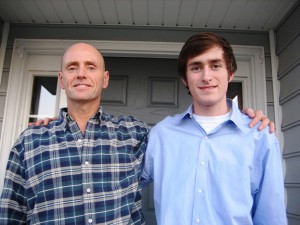After running his first marathon in November 2010, Todd Smith was in the best shape of his life. At 49 years old, he felt great. So it came as a surprise in early 2011 when he started having frequent bouts of unexplained lightheadedness.

“I actually fainted in January and didn’t even realize it,” Todd says. “My son asked if I was ok, and I didn’t understand why he was asking me that. He looked at me with a worried look on his face and said, ‘Dad, you just passed out.’”
What are Premature Ventricular Contractions?
A resident of Richmond, Todd consulted with a cardiologist there who, after performing a stress test, told him he was suffering from a heart rhythm disorder called premature ventricular contractions (PVCs).
During PVCs, the heart beats more often than it should, resulting in insufficient circulation. This decrease in blood flow leads to lightheadedness and fainting. In Todd’s case, the only time he didn’t experience PVCs was when he was running.
The lightheadedness persisted, and simple activities became very difficult. “Just getting up from a chair to walk to the kitchen made me feel like I was going to pass out,” he says. “It got to the point where I had to plan my days around it.”
Ablation: The Doctor’s Orders
Todd decided it was time to meet with a UVA heart specialist. “I knew the reputation UVA has for their heart and vascular services, and I wanted to be treated by the best of the best. That is what I got at UVA, and then some.”
He met with UVA cardiologist Robert Battle, MD, who specializes in the treatment of cardiovascular disorders in elite athletes.
Dr. Battle recommended that Todd have a procedure called ablation, where flexible catheters are inserted into blood vessels in the leg and guided to the heart using advanced imaging techniques. The team then records the electrical signals from the heart and identifies the source of the PVCs. That exact location is then ablated, or “burned,” so scar tissue forms and normal heart rhythm is restored.
“The structure of Todd’s heart was normal, but he had developed an abnormal electrical focus in his right ventricle causing thousands of extra heart beats every day,” says John Ferguson, MD, an electrophysiologist with UVA’s Heart Rhythm Center. “We weren’t surprised that he was so symptomatic. Medications aren’t very effective in this situation, but catheter ablation can cure over 90 percent of this sort of abnormal rhythm.”
A Speedy Recovery
The procedure was finished in about four hours, and Todd was sent home the same day. That was on a Tuesday, and by Saturday he was back outside, completing a 10-mile training run with no pain at all.
“I couldn’t believe how painless it was,” he says. “I had the procedure in August, and in November I ran the Richmond marathon and beat my previous time by 10 minutes.”
Dr. Ferguson adds, “It’s very gratifying to see how well Todd has done following his procedure. He’s a striking example of how catheter ablation can completely cure this problem and return a patient to normal life without the need for life-long medications. This has huge benefits in symptomatic athletes who can get back to rigorous training shortly after ablation.”
Not only did Todd improve his running time, but he also finished the marathon ranked eighth in his age group. Todd will meet with Dr. Battle in March 2012 to make sure everything is still running smoothly, but he considers himself 100 percent cured.
“I couldn’t have asked for a better outcome,” Todd says. “I’m so glad I made the decision to go to UVA. When it comes to having the best doctors, the best treatments and the best research under one roof, there’s no better place to go.”
Find out more about the UVA Heart Center.